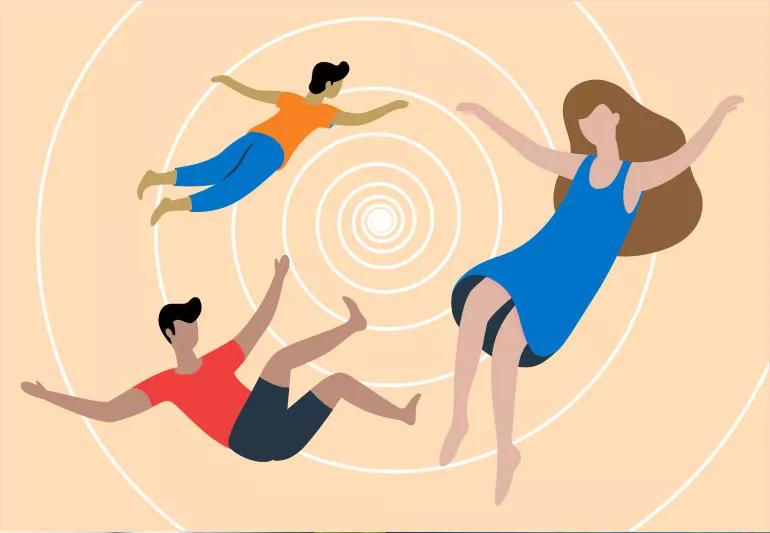Many things can trigger these sensations

If you’ve had a falling sensation before going to sleep or noticed your entire body twitch before sleeping, you’re not alone. This is a common occurrence and it’s been estimated that 70% of the population may experience it in some form or another.
Advertisement
Cleveland Clinic is a non-profit academic medical center. Advertising on our site helps support our mission. We do not endorse non-Cleveland Clinic products or services. Policy
Feeling a twitch, jerk or having a falling or floating feeling while sleeping can occur in people who are otherwise healthy. Although these sensations of motion can happen for a variety of reasons, sleep disorders specialist Reena Mehra, MD, MS, explains some likely causes, common triggers and advice on when you should see a doctor.
This phenomenon of involuntary muscle movement while sleeping is called sleep myoclonus (also called hypnic myoclonus) and happens during sleep transitions as you shift from one sleep phase into another.
The specific muscle movements that occur as a result are also called hypnagogic jerks (or hypnic jerks) and are most likely to happen as you first begin to fall asleep, and during the light stage of sleep immediately following.
One theory is that this stage of sleep is light enough that your brain may misinterpret it as wakefulness — but it also recognizes that your muscles aren’t moving. This leads your brain to send a message to your muscles as a check-in of sorts, to wake them up or keep them active or reactive as a means of protection.
Neurotransmitters are released and carry the message from your nerve cells, attaching to your muscle protein cells. This attachment signals the receiving cells to act in a certain way — specifically in this case, to get your muscles moving.
Advertisement
“The result is likely that feeling of movement, falling or a jerk as your muscles are stimulated,” Dr. Mehra says.
“Making sure you’re doing what you can to reduce triggers is important in helping your overall quality of sleep and may help in reducing the frequency of these types of sleep-disturbing movements,” Dr. Mehra says.
Try to reduce the following to improve your sleep health.
Dr. Mehra recommends that if you experience these involuntary movements during your sleep frequently, myoclonus can be a symptom of more complex sleep disorders.
“If these movements regularly keep you awake, give you anxiety about going to bed or become frequent and you have concerns, be sure to see your doctor to explore treatment that’s best for you,” she says.
Advertisement
Learn more about our editorial process.
Advertisement

Sleep disorders, mental health conditions and other health concerns can all affect the quality of your sleep

Most people fall asleep within 10 to 20 minutes, but if your experience is different, adjusting your sleep schedule may help

Stick to a consistent schedule, be mindful of screen time and work on reducing your stress levels before bed

Napping can boost focus, memory and mood — if you time it right
These devices can help shed light on what’s happening with your body during rest

Keep a dream journal, set your intentions before bed and make sure you’re getting a full night of high-quality sleep

Controlling your dreams may help you tap into your creativity and even reduce anxiety

A 15- to 20-minute power nap is best to boost alertness — beware napping longer than an hour

Wearing a scarf, adjusting your outdoor activities and following your asthma treatment plan can help limit breathing problems

Your diet in the weeks, days and hours ahead of your race can power you to the finish line

When someone guilt trips you, they’re using emotionally manipulative behavior to try to get you to act a certain way